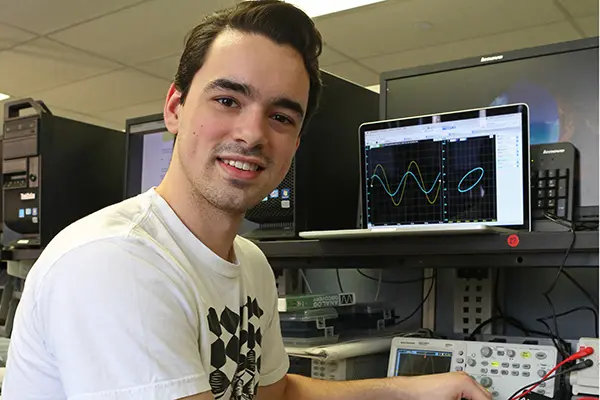Electrical, Computer Engineering Majors Put Theory into Practice

05/20/2017
By Edwin Aguirre
Students in the Electrical and Computer Engineering (ECE) program are getting the hands-on training they need to apply theory from their classes to real-world engineering. This is made possible by a new model for teaching ECE laboratories that’s been developed by Prof. Jay Weitzen and Laboratory Manager Dohn Bowden. Called “Laboratory Anywhere,” this innovative approach is based on the Analog Discovery module, which allows students to experiment on their own time and at their own pace from practically anywhere.
“We need to provide students not only with math, physics and engineering theory, but also significant hands-on laboratory and open-ended design experiences so they are ready for high-technology jobs of the 21st century,” says Weitzen. “There is no substitute for hands-on experience – you cannot compensate for it with more theory and textbooks. It is very difficult for students to develop these hands-on skills with only limited lab time available each week.”
The Analog Discovery module connects to the students’ laptop or desktop computer via USB and, along with free software that they can download, converts their computer into a fully functioning oscilloscope, waveform generator, logic analyzer, voltmeter, spectrum analyzer and power supply.
“This is not a virtual lab, with PC-based simulations of circuits and presumed results. It’s a real, working electronics test bench that fits in your pocket,” explains Weitzen. “With the Laboratory Anywhere-based curriculum, students get individualized hands-on experience that requires the learner to take responsibility for managing his or her learning curve and to become proficient in using basic and advanced test equipment.”
For Weitzen and Bowden, Laboratory Anywhere is more about a philosophy of teaching rather than merely an electronic gadget.
“It is about taking the traditional laboratory model, in which students go to the lab once or twice a week and spend a few hours using the lab’s test equipment, and bringing it to new level, wherein students are given the freedom and flexibility to work on their projects practically anywhere, on or off campus. While the Analog Discovery module looks unimpressive, its capabilities and how it can transform engineering education is unlimited. It gives students the tools to innovate and create independently,” says Weitzen.
“The Analog Discovery module replicates all the current lab bench test equipment, and as a bonus, it contains numerous other pieces of test equipment that are not currently available on the students’ benches,” says Bowden.
Michael Nuzzo, an electrical engineering sophomore, agrees. “Lab Anywhere is a neat little device that covers all of the basic functions of our lab’s expensive and bulky test equipment,” he says. “I’ve heard stories from alumni who used to have to come to the labs at night or on weekends so that they could finish their lab coursework, and the university had to provide staffing to the labs on weekends to accommodate this. By contrast, I have done my lab work in the library, in my dorm room and even outdoors using my laptop as a power source. It saves a lot of time and travel to be able to do these from the comfort of my home.”
Flipping the Laboratory Model
Under the Laboratory Anywhere-based curriculum, freshman ECE students learn the basic functions of the Analog Discovery kit and do projects to better understand electrical engineering fundamentals such as designing a microprocessor-based traffic light controller, a digital night light or a starting system for sailboat racing.

Junior students are expected to come to the lab and work one week on a conventional test bench. The next week they work on their projects on their own using the Analog Discovery kit. If the students need help, they come to the lab and get assistance from Bowden or the teaching assistants. Weitzen and Bowden call this the “blended flipped laboratory” teaching model.
Last summer, Blackboard, a virtual learning environment and course-management system, was introduced as an aid to the traditional face-to-face lab setting. “We are also experimenting with providing remote access via some form of instant messaging or Skype so students can ask the lab teaching staff questions when they are off campus,” says Weitzen. “This will provide additional support to our large, nonresidential student population.”
Cost-Saving Advantages
Traditional engineering laboratories are expensive to equip, run and maintain. The basic Analog Discovery kit costs less than $200 each, which is about the same as an engineering textbook. Students buy the kit while taking their freshman introductory ECE course and can use it throughout their undergraduate years. There are a few kits available for checkout for students who cannot afford them.
The flipped laboratory model has helped save the department money related to staffing and test equipment, Weitzen says: “Using the lab kits also helps address critical space issues since Laboratory Anywhere-based classes are run in general computer labs or open classroom areas instead of specialized, purpose-built electronics teaching labs.”
Department surveys have shown that Laboratory Anywhere has helped with student satisfaction. “Students clearly had fun and enjoyed coming to lab,” says Weitzen. “The increased hands-on experience directly benefited the students in obtaining internships, co-ops and technical summer jobs.”
